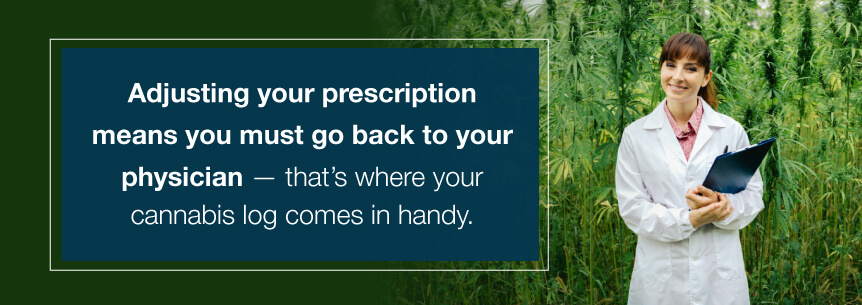
Medical marijuana treatments are revolutionizing the lives of patients around the world. People with treatment-resistant conditions are living fuller lives, and those suffering from debilitating disorders are pairing cannabis with more conventional medications to get additional relief. If you’re one of the growing number of medical marijuana patients, you’ve already discovered the benefits of this amazing plant.
Unfortunately, marijuana is still classified as a Schedule I drug by the federal government, meaning each state is responsible for legalizing and creating its own medical cannabis program. But, the first step to enter the marijuana program in most states is to receive a recommendation from a physician with whom you have established a bona fide relationship.
After getting a recommendation and receiving a medical marijuana card, many states allow you work with a local dispensary to choose your own medical marijuana medications. However, some restrict cannabis usage to whatever your doctor recommends or prescribes. That means they decide on the strain, the dosage and the method of consumption.
If you feel you need to change your medical marijuana prescription in any way, you may be required to get the go-ahead from your recommending physician. A positive working relationship with your marijuana doctor is essential for your health and well-being, as well as to ensure you get the right type and dosage of medicine for you.
Establishing an open and honest relationship with your physician is essential. After all, many states require you to receive your cannabis recommendation from the same physician every time you need a renewal. If for some reason you need to adjust your prescription, an easy rapport with your recommending physician will make that process easier.
When a doctor recommends medical marijuana, they are stating they believe this type of treatment will be beneficial for your condition. And as your recommending physician, they take responsibility to ensure you know the risks and benefits. They also oversee your usage to make sure you’re not struggling with any adverse side effects.
In many states, much like a traditional prescription, your doctor will prescribe the type of medical marijuana they feel is best for you, along with dosing instructions. Your dispensary will then give you the specified type and amount of cannabis, just like visiting a pharmacy.
The best way to speak to your doctor about changing your marijuana prescription is by keeping a cannabis log that includes information such as:
After receiving your medical marijuana recommendation and using the medication for some time, you will have a pretty good idea of how it’s benefiting you. If you’re feeling the therapeutic side effects of the cannabis to their full extent, you may be happy to stick with your doctor’s recommendation. However, many patients must search to find the right balance.

Adjusting your prescription means you must go back to your physician — that’s where your cannabis log comes in handy. You can show them in writing that your medication is not working to its best advantage, so they must make a change to your prescription.
Some of the things you and your doctor will need to consider when adjusting your prescription include the following:
Because cannabis medications are relatively new, it may take some time to find the correct dosage. Be patient with your doctor as they work with you to find the right dose level. However, be honest, as well. If you feel you need more, be sure to vocalize your request.
Dosing medical marijuana is not a precise science, as several variables come into play, including the:
Your doctor will probably start you with a small dosage because it allows you to adjust your treatment to the side effects and get a feel for the cannabis medication. From there, you can discuss with them if you need to up the dosage.
Because CBD is the cannabinoid with no psychoactive side effects, most doctors will prescribe CBD oil or CBD dominant strains of marijuana initially. This cannabinoid has many therapeutic benefits, and it may be the correct choice for your condition.
Although THC does cause the “high” that gives marijuana it’s negative reputation, it’s also extremely beneficial for many medical purposes. THC helps treat several symptoms, including nausea and depression. Also, researchers are finding the combination of THC and CBD is what gives cannabis some of its most powerful medicinal benefits.
Finding the right variety of cannabis may require some trial and error, as well. The main types of cannabis strains are sativa, indica and hybrids. Sativas are reputed for causing energy and elevating mood, while indica strains known for their ability to induce sleep and create a sense of calm. Hybrids often combine the best of both strains.
Depending on your condition, one strain may work better than another. This is where an open discussion with your physician is essential, so you can both decide on the right variety for you.
Each strain of cannabis is unique. If a certain variety is giving you incredible benefits, you and your physician will probably be content to stick with it. However, if it’s causing unwanted side effects, some adjustments will have to be made. In your cannabis log, keep a record of how your medication is affecting you. Then, your doctor will have something to work with when adjusting the dosage or finding a new strain.
As with most medications, it’s possible to build up a tolerance to medical marijuana. This usually takes time, especially if you’re only taking the recommended dosage. However, the cannabinoid receptors in your body can adjust to medical marijuana, making it less effective.
If this begins to happen, you and your doctor will have to come up with a plan to control it. Some methods may include:
Just like dosing and the variety of cannabis you use, the method of consumption greatly impacts how you experience your medication. There are several main consumption methods, and each has different advantages and drawbacks:
Your doctor may recommend one method, but you may feel a different way of consuming cannabis would be more beneficial for your lifestyle. If that’s the case, do your research and have a frank conversation with your physician — they may have never considered what you propose.
Although your doctor is there to aid in your health and well-being, you should always have a say about your care. If you feel like your physician is not informed about the benefits and potential of medical marijuana, you may need to find a different recommending physician. Search our directory of qualified marijuana doctors near you to find someone you can have a positive working relationship with.
No Information on MarijuanaDoctors.Com should be used to diagnose, treat, prevent or cure any disease or condition. You can view our Full Disclaimer here.